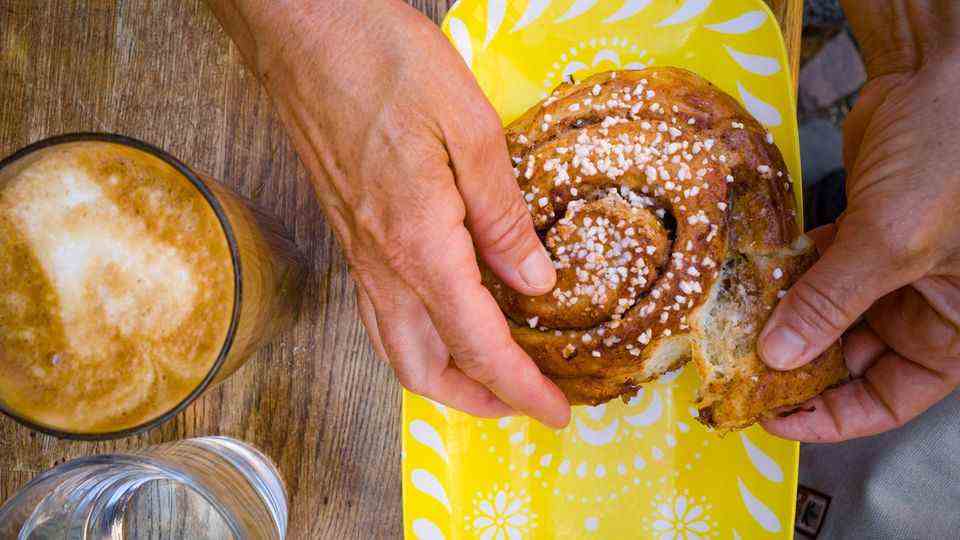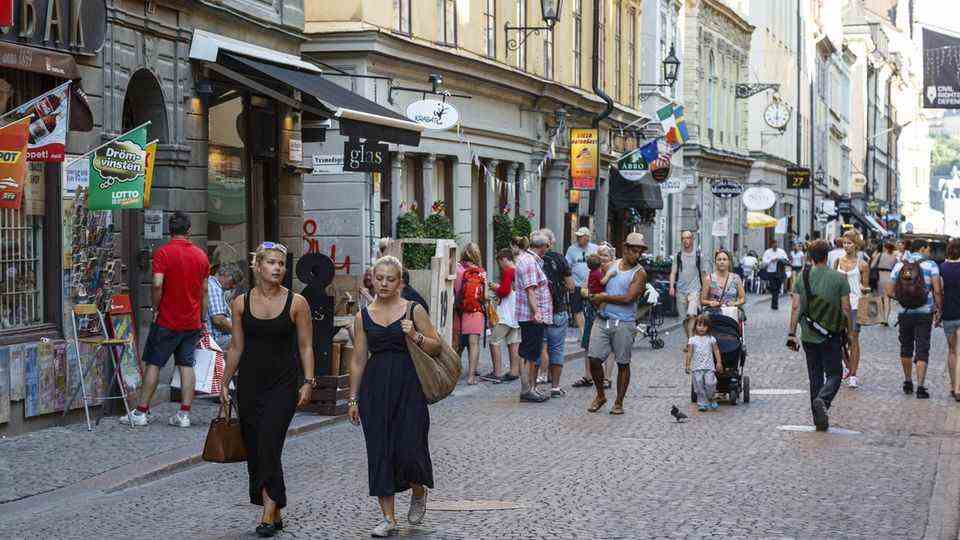Fika is more than just a coffee break in Sweden. Whether private or in professional life: the short get-together offers an opportunity to switch off from the stressful everyday life.
Imagine you are sitting in the office, you have already completed several hours of concentrated work and you are slowly getting tired. Suddenly the scent of fresh coffee and cinnamon fills your nostrils – that smells like a break. A few minutes in which you can chat with your colleagues over coffee and pastries. Once in the morning and once in the afternoon.
Fika stands for social time out
What may sound like a dream is reality for almost all employees in Sweden and an integral part of everyday working life. The break even has a name. “Fika” is a traditional, social ritual that describes an informal get-together.
The name also derives from the hot drink. The term is based on the ancient Swedish word for “kafi”. Itinerant traders developed a secret language by swapping syllables in the early 20th century. “Kafi” thus became “Fika”. In the course of time, the coffee group only established itself among housewives. Gradually throughout society. The tradition has become a social institution and is firmly embedded in the Swedish way of life.
Fika should prevent accidents at work
Fika found its way into working life in the early 1990s after it was found that most accidents at work happen around 10 a.m. and 3 p.m. To minimize the risk, short coffee breaks were introduced at the appropriate times. In most Swedish companies, breaks are scheduled and even mandatory for employees.

A typical fika includes coffee and cinnamon rolls, Sweden’s national pastry.
© Alexander Farnsworth/ / Picture Alliance
What’s more: the short rest period is even legally guaranteed to employees. With every full hour of work, the employee earns a five-minute break. “A fika that everyone participates in plays an important role in the workplace,” explains Viveka Adelswärd, Professor of Communication at Linköping University.
“It means a break from work. Both employees and employers benefit from it,” explains the researcher in one University text. Because the short work break not only reduces the risk of injury, but also increases productivity. The prejudice that employees do less with more breaks has long been disproved by research. “The opposite is the case,” says Adelswärd.
Breaks boost productivity
Such meetings are conducive to efficiency at work. studies have done so more than once. dr Johannes Wendsche, psychologist at the Federal Institute for Occupational Safety and Health, evaluated 160 studies from the past 25 years that dealt with exactly this topic.
The majority of the studies found the same positive effects that short time-off periods have for the worker. Performance and mental well-being increase, while physical complaints, accidents and errors decrease. No wonder, then, according to psychotherapist Gerhard Blasche from the Medical University of Vienna, the breaks relieve body and mind and bring more mindfulness to everyday work.
Disconnect completely
Since fatigue is primarily eliminated at the beginning of the work break, the expert advocates several short breaks. The greatest recovery comes from “taking a break from the work process completely and not for too long,” advises a neuroeconomist Argang Ghadiri.
Switching off for a few minutes several times a day – that’s exactly the concept of the Swedish fika. Such breaks also mean a short idle time for the brain. Over time, new information can be processed and classified. It is not uncommon for this to release mental blocks, bring the solution to a problem to light and stimulate creativity. “Our brain needs breaks to be productive,” emphasizes Ghadiri.
Fika for social interaction
The employees themselves notice that too. According to the German-Swedish Chamber of Commerce 60 percent of employees feel more productive in their work thanks to the short breaks.

The short coffee break offers an opportunity to exchange ideas with colleagues and superiors.
© Westend61 / Imago Images
When the Swedes put on a fika, it’s not just about interrupting work, it’s also about working together. Ideally, everyone in the company takes part – it is considered impolite to decline an invitation to the fika. The entire workforce should be involved, both employees and managers, regardless of their position. “The hierarchy dissolves during the fika,” explains scientist Adelswärd.
“Management by Fika”
“In many establishments there is a real management by fika,” agrees Edward Blom, an expert on historical food culture in Sweden. Drinking coffee together is an expression of the country-specific, more democratic corporate culture. You meet at eye level.
In addition to the social aspect, the working hours of the Scandinavians also contribute to greater satisfaction. From the “OECD Better Life Index“, which measures and compares well-being in different countries, shows that just one percent of workers work overtime.
Six hours instead of eight
Some companies have even reduced working hours. A pilot project in a retirement home in Gothenburg already showed the advantages of shorter working days in 2017. For two years the orderlies had worked six hours instead of eight. Researchers had accompanied the experiment and found that the rate of illness fell and the staff felt happier and less stressed. Those in care also benefited because the employees suddenly organized more activities for the residents.
For cost reasons, the city ended the project after the deadline. But the results caused a stir, so the experiment was carried out in other industries and communities in the country. Some Swedish start-ups have already made the six-hour day the standard.
Sweden one of the happiest countries
Hardly any overtime, instead short and convivial coffee breaks. No wonder Swedes are considered one of the least stressed workers in the world. The general well-being in the Scandinavian country is above average.

Pedestrians in the old town of Stockholm. The people of Sweden are among the happiest people in the world.
© robertharding / Imago Images
In the “Better Life Index”, Sweden scores top marks in almost all categories. On a scale representing general life satisfaction from zero to ten, Swedes place themselves at 7.3, higher than the average of 6.5. Also in “World Happiness Report ” Sweden regularly ranks among the top ranks. The report published by the UN annually determines where the happiest people live. The answer is clearly Northern Europe.
In 2020, Sweden ranked sixth. The top spots are also occupied by Nordic countries: Finland, Iceland and Denmark lead the ranking. Germany follows immediately behind Sweden. So we are on the right track. Maybe we just need a little more sociability and mindfulness in our professional lives to catch up with the Scandinavians.
Swell: “pharmacy magazine“, BBC, BBC, brain light, German-Swedish Chamber of Commerce, OECD Better Life Index, University of Linkoping, World Happiness Report




